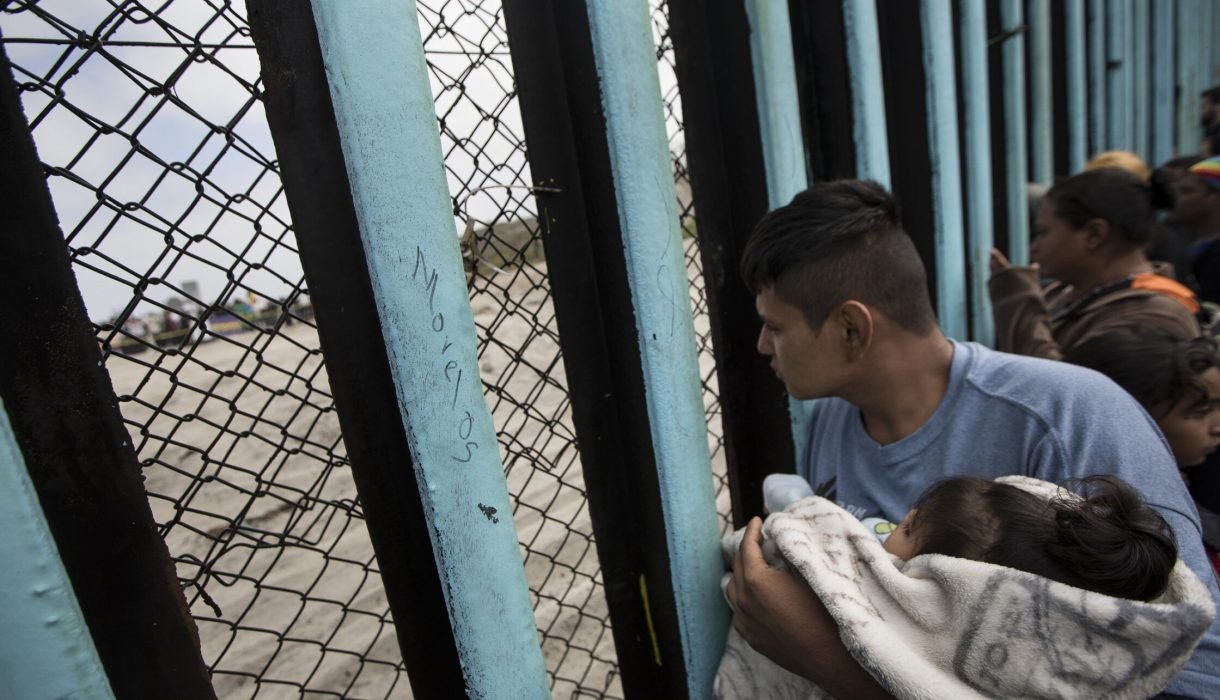
Decoding Trump-era Immigration Policies: A Perspective from the Inside.
This in-depth article explores how Trump-era immigration enforcement, as described by a former ICE official, became a tool of political theater—targeting vulnerable Venezuelan migrants and exposing a system overwhelmed by inefficiencies, cruelty, and moral contradictions. It calls for a humane, data-driven reform agenda rooted in public safety and constitutional values.
The complexities of Donald Trump’s immigration policies, highlighting the consequences for migrants, particularly Venezuelan nationals, and featuring insights from a former ICE official.
In a recent episode unfolding within the U.S. immigration system, a group of nearly 30 Venezuelan nationals found themselves on the brink of deportation, only to have their journey abruptly halted by a Supreme Court mandate. This event not only showcases the turbulent reality faced by many migrants but also serves as a stark reminder of the larger implications of immigration policy during the Trump administration. As the narrative surrounding immigration continues to evolve, it begs the question: what does it mean for our society and global standing?
The Context of Immigration Under the Trump Administration
Recent events have brought the spotlight back to immigration policies under the Trump administration, particularly concerning Venezuelan nationals. Nearly 30 individuals held at the Blue Bonnet detention center in Texas faced imminent deportation. This situation escalated quickly, as exclusive footage from NBC News showed these detainees being loaded onto a bus, seemingly headed for an airport in North Texas. But just moments before this transfer, an emergency federal court hearing was underway.
Emergency Federal Court Hearings
The urgency of the situation was palpable. The Supreme Court intervened, ordering a temporary halt to deportations under the Alien Enemies Act for these Venezuelan nationals. This intervention raises critical questions about the enforcement practices of immigration policies. Are these policies truly serving the interests of justice and safety?
Jason Hower, a former Immigration and Customs Enforcement (ICE) official, has been vocal about his concerns. He stated,
“Immigration enforcement under Donald Trump is going rogue.”
Hower argues that the current strategy is more about political theater than genuine safety. He believes it targets vulnerable populations rather than focusing on those who pose real threats to society.
The Role of Video Evidence
Video evidence plays a crucial role in highlighting the experiences of migrants. It captures the raw emotions and realities faced by individuals seeking refuge. In this case, the footage of detainees being transported for deportation serves as a stark reminder of the human element in immigration enforcement. It’s not just about policies; it’s about people.
Emerging Narratives Around Migrant Safety
Hower emphasizes that the current enforcement tactics dehumanize migrants. Instead of viewing them as individuals fleeing dire circumstances, they are often framed as threats. This narrative creates a culture of fear, undermining the constitutional protections that should be afforded to all individuals, regardless of their immigration status.
- Recent deportation events involving Venezuelan nationals highlight the urgency of the situation.
- Emergency federal court hearings are becoming more common as individuals seek to challenge their deportations.
- The role of video evidence is crucial in bringing attention to the experiences of migrants.
Moreover, the systemic issues within the U.S. immigration system are glaring. There are approximately 14 million individuals on the immigration docket, yet only about 6,000 deportation officers within ICE. This disparity raises significant operational concerns. Hower points out that simply rounding up detainees does not address the core issues plaguing the immigration system. Instead, it often leads to wrongful targeting of vulnerable populations.
Statistics illustrate the operational limitations faced by ICE. Although the agency can arrest around 20,000 individuals in a month, only about 10,000 to 12,000 can be deported. This inefficiency is exacerbated by countries like Venezuela and Cuba refusing removal flights. Hower criticizes the focus on punitive tactics rather than reforming the underlying immigration structure.
Furthermore, the conflation of seeking asylum with criminality complicates matters. Merely entering the U.S. to seek refuge is often mischaracterized as a criminal act. This philosophy fuels a punitive approach to enforcement, making it even harder for those genuinely in need of protection.
Hower’s insights reveal a troubling reality. A politically charged and punitive enforcement strategy harms both communities and the individuals pursued. It creates cascading negative effects on the economy and industries reliant on these workers. The need for a more humane approach is clear.
As the conversation around immigration continues, it’s essential to remember the human stories behind the policies. The plight of Venezuelan nationals seeking refuge is just one example of the broader struggles within the U.S. immigration system. The ongoing challenges highlight the importance of aligning law enforcement policies with humanitarian laws and the genuine needs of migrants.
Challenging the Narrative: The Reality of Migrant Lives
The portrayal of migrants in the media often leans towards viewing them as threats. This narrative overshadows the reality that many are simply seekers of refuge. They flee from violence, poverty, and persecution. But why is there such a stark contrast between perception and reality?
Assessing the Portrayal of Migrants
When discussing migrants, the language used can be powerful. Terms like “illegal” or “criminal” create a sense of danger. Yet, many migrants are not criminals; they are individuals seeking safety. For instance, consider the recent situation involving nearly 30 Venezuelan nationals at the Blue Bonnet detention center in Texas. They were set for deportation, but an emergency hearing halted their transfer. This incident highlights the precariousness of their situation.
Former ICE official Jason Hower criticized the current enforcement strategies as “political theater.” He argues that these tactics distract from real public safety issues. Instead of targeting genuine threats, the focus shifts to vulnerable populations. This misrepresentation dehumanizes those who are simply trying to escape dire circumstances.
Statistics on Deportations
Statistics paint a stark picture of the immigration landscape. There are approximately 14 million individuals on the immigration docket in the U.S. However, there are only about 6,000 deportation officers available to manage these cases. This disparity raises questions about the efficiency and effectiveness of the current system.
- ICE can arrest around 20,000 individuals in a month.
- However, only 10,000 to 12,000 can actually be deported.
- Countries like Venezuela and Cuba often refuse removal flights, complicating the process.
This operational inefficiency suggests that simply rounding up migrants does not solve the underlying issues. Hower emphasizes that the focus should be on reforming the immigration system rather than punitive measures.
Humanitarian Implications of Deportation Strategies
The humanitarian implications of current deportation strategies are profound. The conflation of seeking asylum with criminality creates a hostile environment for those in need. Merely entering the U.S. to seek refuge is often mischaracterized as a criminal act. This philosophy fuels a punitive approach to enforcement, complicating the lives of genuine asylum-seekers.
Hower points out that the current administration’s tactics harm both communities and the individuals pursued. The negative effects ripple through the economy and industries that rely on migrant labor. The dismantling of necessary resources within immigration courts and agencies only exacerbates the situation. Layoffs among immigration judges and case officers leave many asylum-seekers without the support they need.
In essence, the current immigration system is fraught with inefficiencies. The challenges faced by deportation officers mirror those of the migrants they handle. The system is overwhelmed, and the focus on punitive measures detracts from the humanitarian laws that should guide immigration policy.
As the debate continues, it is crucial to recognize the humanity of migrants. They are not just statistics or threats; they are individuals with stories, hopes, and dreams. Understanding their plight is essential for fostering a more compassionate and effective immigration system.
Recommendations for Reform: Moving Beyond Polarization
The U.S. immigration system is at a crossroads. Recent events have highlighted the urgent need for reform. The deportation of nearly 30 Venezuelan nationals from the Blue Bonnet detention center in Texas raised significant concerns. This situation exemplifies the systematic issues within the immigration enforcement framework. It’s time to address these problems head-on.
Addressing Systematic Issues
One of the most pressing challenges is the operational disparity within immigration enforcement. There are approximately 14 million individuals on the immigration docket, yet only about 6,000 deportation officers within ICE. This imbalance creates a bottleneck in the system. As former ICE official Jason Hower pointed out, simply rounding up detainees does not solve the core issues. Instead, it distracts from public safety and national security objectives.
Hower described the current enforcement strategy as “political theater.” This approach targets vulnerable populations rather than focusing on genuine threats. It raises the question: how can a system that dehumanizes migrants seeking protection truly serve the interests of public safety?
Increased Resources and Support
To create a more effective immigration system, there is a critical need for increased resources and support for immigrant communities. This includes not only more personnel but also better technology and infrastructure. Hower emphasized that the dismantling of necessary resources within immigration courts and agencies has left many asylum-seekers without the support they need.
- Invest in more immigration judges and case officers.
- Enhance technology to streamline processes.
- Provide community support services for immigrants.
By prioritizing these resources, the U.S. can begin to address the humanitarian needs of migrants. As Hower stated, “What we need is an immigration system that focuses on public safety without neglecting our humanitarian values.” This balance is essential for a just and effective immigration policy.
Data-Driven Approaches
Another vital recommendation is to adopt data-driven approaches to improve public safety. This means using evidence and statistics to guide policy decisions. For instance, while ICE can arrest around 20,000 individuals in a month, only about 10,000 to 12,000 can be deported due to various countries refusing removal flights. This inefficiency highlights the need for a more strategic approach.
Data can help identify genuine threats while ensuring that vulnerable populations are not wrongfully targeted. It’s crucial to shift the narrative that conflates seeking asylum with criminality. This misconception fuels punitive enforcement tactics that complicate the situation for those genuinely in need of protection.
The Importance of Humane Treatment
Prioritizing humane treatment in legislation and enforcement practices is essential. The current system often frames migrants as threats rather than individuals fleeing dire circumstances. This narrative not only undermines constitutional protections but also harms communities and the economy. Hower noted that a politically charged enforcement strategy can have cascading negative effects on industries reliant on immigrant workers.
It’s time to prioritize those migrants who have exhausted their lawful pathways. As Hower stated, “It’s time to prioritize those migrants who have exhausted their lawful pathways.” This shift in focus can lead to meaningful change and a more humane immigration system.
Addressing the systematic issues within immigration enforcement, increasing resources for immigrant communities, and adopting data-driven approaches are crucial steps toward reform. By prioritizing humane treatment and bipartisan support, the U.S. can reshape immigration enforcement in a more effective and compassionate manner.
Conclusion: A Call for Compassionate Immigration Policies
The ongoing discussions surrounding U.S. immigration policies reveal a pressing need for change. Recent events, such as the attempted deportation of nearly 30 Venezuelan nationals from the Blue Bonnet detention center in Texas, highlight the complexities and challenges within the system. These individuals were moments away from being deported when an emergency court hearing intervened. This incident underscores the urgent need for reforms that prioritize human dignity over political agendas.
Insights from former Immigration and Customs Enforcement (ICE) official Jason Hower provide a critical insider perspective. He describes current immigration enforcement as “political theater,” targeting vulnerable populations rather than focusing on genuine threats to public safety. This approach dehumanizes migrants, framing them as adversaries rather than individuals fleeing dire circumstances. Hower’s observations reveal a troubling trend: the conflation of seeking asylum with criminality. This narrative not only undermines constitutional protections but also contradicts the core American values of compassion and justice.
Moreover, the operational challenges within ICE are alarming. With approximately 14 million individuals on the immigration docket and only about 6,000 deportation officers, the system is overwhelmed. Hower points out that while ICE can arrest around 20,000 individuals in a month, only 10,000 to 12,000 can actually be deported. This inefficiency is exacerbated by countries like Venezuela and Cuba refusing removal flights. Such statistics illustrate the systemic issues that plague the immigration system, emphasizing the need for a more humane and effective approach.
Current policies create a narrative of fear around migrants. This fear distracts from the real issues at hand and harms both communities and the individuals pursued. Hower argues that a punitive enforcement strategy not only fails to address the root causes of migration but also has cascading negative effects on the economy and industries reliant on migrant workers. The dismantling of necessary resources within immigration courts and agencies further complicates the situation, leaving asylum-seekers without the support they desperately need.
As the conversation around immigration continues, it is crucial to reflect on the impact of these policies on human lives. The struggles of migrants should be understood within a larger context of humanitarian crisis. Collective action is necessary to push for legislative reform that aligns with American values. It is time to advocate for policies that recognize the humanity of those seeking refuge and protection.
In conclusion, the current immigration enforcement practices must be re-evaluated. The insights from insiders like Hower serve as a call to action. It is essential to align immigration policies with compassion and justice, ensuring that the rights of migrants are upheld. The pressing need for change is clear, and it is up to society to demand reforms that reflect the true spirit of America—a nation built on the principles of liberty and justice for all.
TL;DR: This post offers a critical examination of the chaotic and often inhumane realities of U.S. immigration policies under Trump, as articulated by a former ICE official, emphasizing the importance of reforming our immigration system for the sake of humanitarian values and public safety.
MigrantDeportation, ImmigrationLawInsights, HumanRights, AsylumProcess, ICEEnforcement, PoliticalTheater, ImmigrationSystemFailures, VenezuelanNationals, TrumpImmigrationPolicies, PublicSafetyAndImmigration
#ImmigrationLawInsights, #HumanRights, #TrumpImmigrationPolicies, #ICEEnforcement, #VenezuelanNationals, #AsylumProcess, #PublicSafetyAndImmigration, #MigrantDeportation, #PoliticalTheater, #ImmigrationSystemFailures,#TrumpImmigration, #VenezuelanDeportations, #ICEWhistleblower, #ImmigrationReform, #AsylumRights, #BlueBonnetDetention, #MigrantJustice, #PublicSafety, #HumanitarianLaw, #JasonHower

